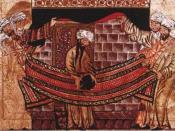The world of Islam
The rise of Islam came about in south-west Asia from the Semitic-speaking Arabs. Both the Arabian Peninsula's arid climate and isolation from other civilizations of the time would prove to contribute to the unique religion which was to form. Islam began around the birth of the prophet Muhammad (570 CE) and would prove to be a successful and flourishing civilization later on.
In pre-Islamic times, the Semitic-speaking group of Arabs was polytheistic, meaning they believed in more than one god, but during the life of the Islamic prophet Muhammad (570-632 CE) this would change into a new religion similar to Christianity and Judaism. The Bedouin tribes of the Arabian Peninsula were for the most part isolated from each other because there was no major river system or source of fertile land to start a large center for a civilization. These tribes each had their own god and worshipped a stone which represented that god.
Most known is the Ka'aba, a massive black meteorite in Mecca. The prophet Muhammad was born in 570 BCE and grew up to be a businessman and military and political leader. He received a vision from the angel Gabriel which was the start of the new religion of Islam. Similar to Christianity and Judaism, this religion was monotheistic, meaning the followers believed in only one god. The main teaching of Islam was the Koran (or Qur'an) which contained 114 suras, or chapters). The main focus of the Koran was that there was only one god, Allah. There were also the five pillars, guidelines to how a Muslim should live their life. After Muhammad's death, his followers chose Abu Bakr to be the caliph (meaning successor) and imam, spiritual leader. In order to recruit more followers, the Muslims traveled the jihad, or...


